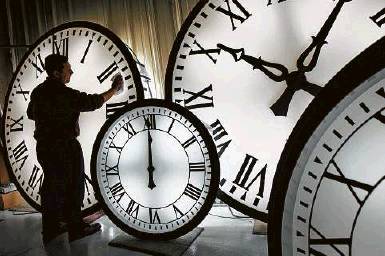Time changes seen as not worth saving
By Kirk Johnson NEW YORK TIMES
A day is a day, with so many hours of darkness and so many of light. It’s a hard reality that no powerful king or brilliant philosopher has ever found a way around. And yet, every year, bless our hearts, we try.
Compelled by the federal Uniform Time Act of 1966, most Americans will leap ahead —or stumble blearily — from one configuration of the clock to another this weekend, as daylight saving time clicks in at 2 a.m. Sunday.
But many people are saying it’s time for time to be left alone. State legislatures from New England to the West Coast are considering proposals to end the leaping, clock-shifting confusion of hours lost or gained.
“I cannot change the rotation of the Earth and sun,” said Kansen Chu, a California lawmaker who is sponsoring a bill to keep the state permanently on daylight time — one of at least 31 states that are addressing some aspect of daylight saving time and its discontents. “But I am hoping to get more sunlight to the people of California.”
Proponents of setting the clock once and being done with it, such as Chu, a Democrat from the San Jose area, said shifting back and forth in the spring and fall, if it ever really made sense, no longer does. California voters agreed last fall, approving a ballot proposition for year-round daylight time by a wide margin.
Lifestyles and patterns of work are different now than they were when daylight time first became entrenched nationally during and after World War II. Chu and others said research has shown that human beings just aren’t as flexible about their daily rhythms as they once seemed; accidents, heart attacks and strokes tend to occur in greater numbers around the time shift.
The 1966 law allows states to opt out of daylight time, and Hawaii and Arizona do, staying on standard time all year. So does Puerto Rico. But the law does not allow states to choose daylight time year-round. So the California proposal, and a similar bill passed by the Florida Legislature last year, would require an act of Congress to take effect.
Josh Yokela, a Republican state legislator in New Hampshire, is working on a way around that problem. He is the lead sponsor of a bill, passed by the state House last month, to request that New Hampshire be shifted into the Atlantic time zone, which would put the state an hour ahead of Eastern Standard Time. Then the state would opt out of seasonal clock changes, as the 1966 law allows.
The key is that moving to a different time zone does not require an act of Congress — all it takes is an order from the Transportation Department, the federal agency that oversees time (a legacy of its duties regulating railroad schedules).
“We would be on the same time as the rest of the Eastern time zone for eight months of the year, because they accept daylight saving time — and when they fall back in the winter, we wouldn’t,” Yokela said.
Scott Yates, a technology entrepreneur in Colorado who runs a website dedicated to staying on daylight saving time year-round, predicted that most of the state bills would go nowhere. Though he believes the idea has gained some legitimacy, with lawmakers thinking especially about the health effects of time changes, it is hardly a top legislative priority for anyone.
“It’s sort of odd, in that it doesn’t have any natural political division to it, but it doesn’t have a natural constituency, either,” Yates said. “It’s actually kind of refreshing in that way.”
